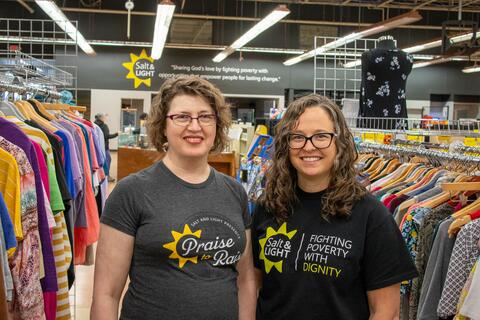
What does it take to break a cycle of generational poverty?
This difficult question provides daily motivation for Lisa Sheltra, director of community engagement at Salt & Light, a ministry with storefronts in Champaign and Urbana. From a spiritual perspective, Sheltra explains, generational poverty is a whole-person experience.
“Many people living in situations of financial need require not just material goods or services but also power and control over their own situation,” said Sheltra. “This represents an enormous shift in thinking among those who experience that powerlessness or lack of autonomy on a daily basis. We help create a space where people can think of themselves as a provider and as capable rather than as someone in need.”
The space where that shift happens is Salt & Light, a retail store premised on gathering an entire community to work together in a single place. Salt & Light eschews a one-way model of giving, in which spaces designated specifically for those in need reinforce top-down charity. Instead, they take an approach of shared community work, where individuals stand side-by-side regardless of financial status.
Beginning as an emergency food pantry in 2004, Salt & Light underwent an adjustment in mission when it reconsidered how it could best contribute to creating healthy individuals, neighborhoods, and a healthier Champaign County. The store supports a participant program for qualifying volunteers, many of whom face difficult or unusual professional circumstances, including seniors for whom social security income may not cover basic needs, people in the disability community who are not part of the traditional labor market, people who would like a soft entry back into the workforce after incarceration or rehab and recovery, and those who simply need to build skills after spending a significant period of time without employment. These participants earn store credit, receiving both material benefit and a sense of community belonging, and work alongside non-credit earning volunteers.
Whereas the food pantry helped people survive by meeting their material needs, the retail storefront sets its sights on promoting resiliency and human flourishing. A significant inspiration for this revised focus originated in Sheltra’s background as a preschool instructor and training in human development at Illinois State and Eastern Illinois universities. To encourage individual growth, Salt & Light offers personal engagement for each community member regardless of their starting point.
“One of our goals is to make everybody a little uncomfortable,” said Sheltra. “That discomfort is an important part of the learning and development process. Part of the way you know you’re growing is that you don’t feel super comfy.”
She noted that everyone has something to gain from the experience of shared work: the focus for every employee volunteer who comes through the door is the development of work skills and social relationships. The store’s emphasis on capacity-building reflects the goals of many of the Family Resiliency Center’s community-based, participatory and empowerment programs, including its youth participatory action research pilot programs, which center the voices of another often undervalued group experiencing power and autonomy disadvantages: young people.
Salt & Light makes a point to call its non-credit earning volunteers “allies”—and they are always looking for new ones. In particular, said Gwenna Pelz, a vocational programs coordinator, the organization seeks community members with a sustained commitment to understanding and alleviating poverty.
“We are looking for allies who are educationally minded or able to facilitate conversation and set goals,” said Pelz. “Ideally these individuals want to fight poverty with dignity by walking alongside someone and building relationships.”